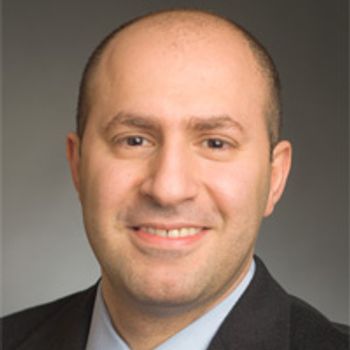
The American Breast Cancer Foundation's (ABCF) mission is to provide financial assistance for breast cancer screenings and diagnostic tests for uninsured and underserved individuals, regardless of age or gender.

The American Breast Cancer Foundation's (ABCF) mission is to provide financial assistance for breast cancer screenings and diagnostic tests for uninsured and underserved individuals, regardless of age or gender.

Alene Nitzky will moderate our next #CureConnect twitter chat about helping patients to get active and fit physical activity into their routine.

Pelvic IMRT causes less GI, GU toxicities than standard pelvic radiation therapy for patients with gynecologic cancers.

A "magic" mouthwash treatment of diphenhydramine, lidocaine, and antacid proved effective in reducing oral mucositis pain in patients undergoing head and neck radiotherapy.

The treatment of TNBC is rapidly evolving, with immotherapies, AR-targeted agents and targeted therapies.

Dense breast tissue can make tumors more difficult to spot in mammograms. And extremely dense tissue may be an independent risk factor for developing breast cancer.


Self-reported smoking quit rates among hospital patients more than doubled after nurse intervention.

Mary Ellen Diotalevi speaks about her role as a nurse in a breast cancer center.


With a donation to Teen Cancer America, people can have the chance to win concert tickets to see music legends at Coachella, thanks to a contest the organization is hosting to raise money for young people battling cancer.

New Awareness and Funding Campaign Aims to Transform Global Research Efforts and Accelerate Clinical Trials for Pediatric Brain Tumor Patients

Sexual health can change dramatically after treatment for cancer but it often goes undiscussed. A recent webinar sought to education healthcare practioners in addressed sexual health concerns with their patients.

For men with positive needle biopsy for prostate cancer, active surveillance (AS) did not negatively impact their quality-of-life compared with men who had a negative prostate needle biopsy.

Although dermatography (medical tattooing) is commonly performed around the world as a component of nipple reconstruction after mastectomy, it is rarely used as an adjuvant to enhance the appearance of scars and skin grafts after surgical procedures.

Between 2014 and 2016, the number of cancer survivors living in the United States rose by one million. This is just one of the many benefits the Cancer Progress Reports lists from cancer research.

ASCO clinical practice guideline offers suggests for treating adult cancer survivors with chronic pain.

Most people don't know much about kidney cancer at the time of their diagnosis. The Kidney Cancer Association wants to change that.

Educate, engage and energize — those are the three main verbs and goals of the Bladder Cancer Advocacy Network’s (BCAN) first ever leadership summit.


Olanzapine, an FDA-approved antipsychotic agent, has been shown to improve the prevention of nausea when added to a standard antiemetic.

By funding research and connecting patients with researchers, doctors and clinical trials, End Brain Cancer is hoping that more people will survive the disease.

Children's Brain Tumor Foundation explains the importance of their research and programs.

Chase After a Cure is running a Thunderclap campaign on Sept. 15 and is asking people to be flashy for a good cause: awareness and funds for childhood cancers. - See more at: http://www.curetoday.com/articles/flashy-for-a-cause-raising-awareness-for-childhood-cancers#sthash.uyBvOZyJ.dpuf

Brain cancer has replaced leukemia as the leading type of cancer causing death among children.

Using mobile apps and other new technologies, clinicians can better monitor and help their patients.

Despite obesity as a risk factor for clear cell RCC, a high BMI is a prognostic factor for improved survival in patients with metastatic RCC.

The NOCC is connecting women who have ovarian cancer to others who are experiencing similar struggles.


In the last two decades, global ovarian cancer mortality rates have either levelled or declined.